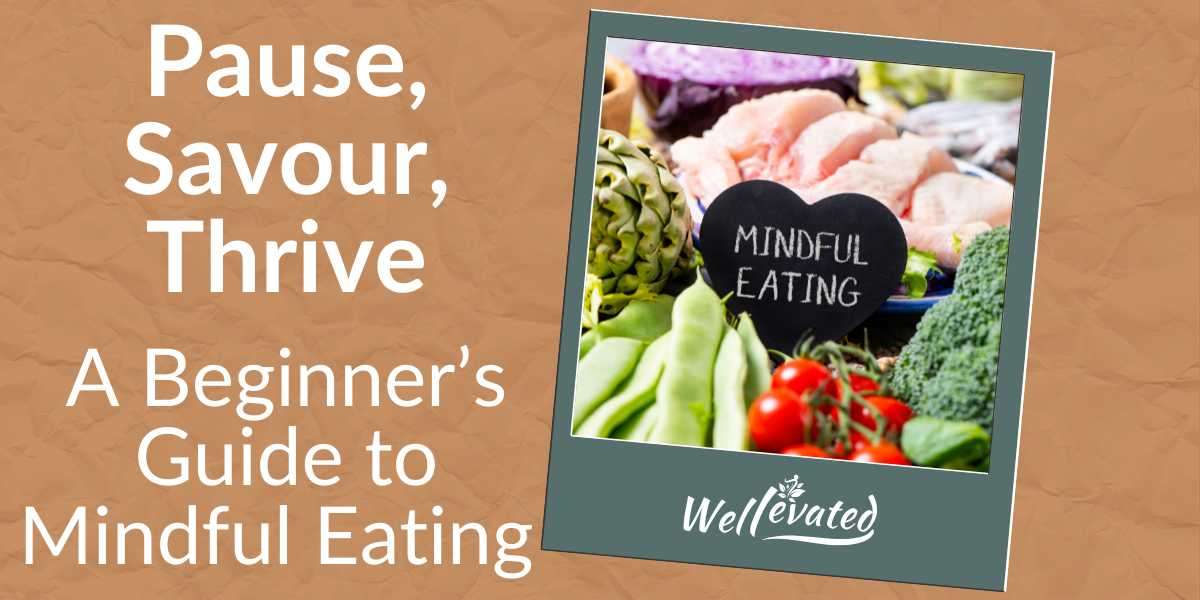Do you find yourself rushing through meals, eating on autopilot, or snacking mindlessly while juggling work emails?
For many of us, eating has become less about enjoyment and more about convenience. But what if we paused, savoured and truly connected with the food we eat?
Enter mindful eating - a life-changing habit that not only nourishes your body but also creates space for calm in a busy lifestyle.
Mindful eating is more than a wellness buzzword; it’s a powerful practice rooted in mindfulness that encourages you to fully engage with your meals - without guilt, judgement, or distraction.
Regardless of where you’re at in life, mindful eating can help you thrive. Whether you’re a busy professional, an entrepreneur always on the go, or someone taking the first steps toward self-care, this guide will show you how to practise mindful eating every day.
What is Mindful Eating?
At its core, mindful eating is the act of being present and fully aware during your eating experience. It’s about slowing down and paying attention to the textures, flavours, smells and even sounds of your food. Unlike diets or restrictive eating plans, mindful eating is not about what or how much you eat - it’s about how you eat.
The concept stems from mindfulness, which involves being fully aware of the present moment. When applied to food, it means noticing your body’s hunger and fullness cues, savouring each bite and cultivating a positive relationship with food.
The benefits are profound:
- Improved digestion thanks to reduced stress as you eat.
- Better portion control as you become more attuned to your body’s needs.
- Enhanced satisfaction from truly enjoying your meals.
- Reduced overeating, emotional eating and food guilt.
Why is Mindful Eating Important?
For many, meals have become rushed or multi-tasked experiences. Breakfast is inhaled during the morning rush. Lunch happens in front of the laptop. Dinner is scarfed down while scrolling on your phone or catching up on Netflix. The result? You feel full but strangely unsatisfied, leading to further snacking and, often, an unhealthy cycle of guilt.
Mindful eating helps you break free from this pattern. It gives you an opportunity to reconnect with your body, make conscious food choices, and rediscover the joy of eating. Beyond the physical benefits, mindful eating can also improve your mental well-being by reducing stress and increasing your appreciation for the present moment.
6 Steps to Practising Mindful Eating Every Day
Transitioning to mindful eating doesn’t require a grand overhaul of your routines. Start small, and with practice, these habits can transform your relationship with food.
- Pause Before You Eat
Mindfulness begins before the first bite. Before you dig in, pause for a moment. Take a deep breath and appreciate the meal in front of you. Where did this food come from? How was it prepared? A moment of gratitude shifts your focus, helping you slow down and eat more thoughtfully.
Pro Tip: Turn off distractions, like the TV or your phone, to help you focus entirely on your meal.
- Engage All of Your Senses
Eating isn't just about taste. Take time to notice the vibrant colours on your plate, the enticing aroma, the crunch of that fresh salad, or the creaminess of your soup. Engaging your senses enhances your eating experience, making each bite more satisfying.
Here’s an exercise to try:
- Look at your food. Notice the colours, shapes and arrangement.
- Smell the food. What aromas stand out?
- Feel it. What texture is present? Is it soft, crispy, rich?
- Hear the sounds your food makes as you eat (yes, even that satisfying crunch!).
- Taste slowly and try identifying subtle flavours you've never noticed before.
- Chew Slowly
This is perhaps the simplest yet most difficult step. Instead of rushing through your meal, take smaller bites and chew each one thoroughly. This not only aids digestion but also gives your brain enough time to register when you’re full.
Challenge Yourself: Try chewing each bite 20–30 times before swallowing. It may feel awkward at first, but over time, it will feel natural.
- Listen to Your Body
One of the key principles of mindful eating is understanding your body’s hunger and fullness cues. Before you start eating, ask yourself:
- Am I truly hungry, or am I eating out of boredom, stress, or habit?
- How satisfied do I feel halfway through this meal?
Paying attention to these signals prevents overeating and helps you give your body what it actually needs, rather than what you think it needs.
- Eat Without Guilt
Mindful eating is a guilt-free zone. It’s time to ditch harmful labels like “good food” and “bad food.” Indulge in your favourite treats without judgement. By practising balance and mindfulness, you can enjoy all kinds of food while maintaining a healthy lifestyle.
For example, that chocolate brownie? Savour it. Notice its sweetness, its texture and how it makes you feel.
- Make Meals a Ritual
Turn eating into a ritual by creating a calming environment. Use beautiful plates, light a candle, or eat in a peaceful space. Rituals signal to your brain that this is your time to enjoy and unwind.
Quick Tip: Set aside even 10 minutes for an uninterrupted meal. You’ll feel more relaxed and in control of your eating habits.
How to Stay Consistent
Mindful eating is a practice, not perfection. Some days you’ll feel entirely present with your meal; other days, you might find yourself scrolling through your phone mid-dinner. That’s okay! The goal is to stay curious and keep practising.
Here are some practical ways to stay consistent:
- Keep a Food Journal: Reflect on how different meals make you feel physically and emotionally.
- Pair it with Other Mindful Practices: Meditation or yoga can complement your mindful eating routine.
- Set Reminders: Add calendar alerts or sticky notes to remind yourself to practise mindful eating.
Pause, Savour, Thrive
Mindful eating isn’t just about what’s on your plate - it’s about creating space for connection, presence and joy in your daily life. By slowing down and savouring your food, you’ll not only improve your health but also find pleasure in one of life’s simplest yet most meaningful activities.
Are you ready to transform the way you eat? Take it one bite at a time. Share your mindful eating experiences in the comments below, or tag us on social media to inspire others.








